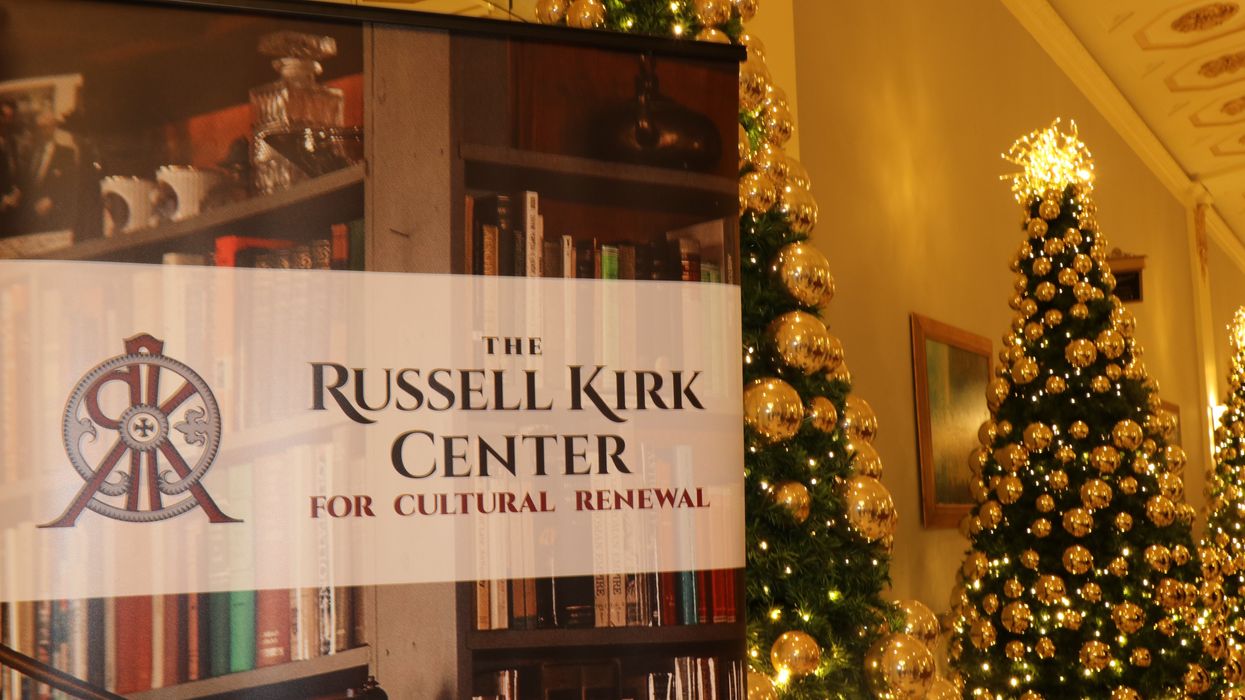Baker and Mason are graduate students for Medill on the Hill, a program of Northwestern University in which students serve as mobile journalists reporting on events in and around Washington, D.C.
Seventy years after Russell Kirk published “The Conservative Mind,” the center named after him revealed plans to develop a school to train conservative thinkers for the future.
The Russell Kirk Center for Cultural Renewal announced The School of Conservative Studies at a Dec. 5 event in Washington, D.C., that was headlined by former Vice President Mike Pence. Pence lauded Kirk as “the intellectual father of the American conservative movement [and] the author of a book we celebrate 70 years now that literally changed the course, not of a movement, but of a country.”
Written in 1953, Kirk’s opus helped fuel the modern conservative movement for decades. The philosophical text promoted ideas like societal order and traditionalism by highlighting prominent conservative thinkers like poet T.S. Eliot and 18th century Irish statesman Edmund Burke.
The book’s 70th anniversary comes as the GOP wrestles with evolving party dynamics. While former President Donald Trump dominates the party, some influential Republicans say he is not a conservative. A recent study by the Associated Press found that just 9 percent of Republicans feel that they can speak openly about their views on college campuses.
One speaker praised Pence’s actions on Jan. 6, 2021, when he rejected Trump’s calls for Pence to declare that the defeated president had actually won the 2020 election.
“Mike Pence will be validated and honored across the political spectrum for the courage that he's shown on that day,” said John Wood Jr., a national ambassador for Braver Angels, a crosspartisan group focused on depolarization. “You just may not be able to see it in the passions of the moment, but we feel that vindication rising.”
Kelsey Baker and Anastasia Mason
Wood’s comments came the day before 10 Wisconsin Republicans who supported Trump’s false election-win claims in 2020 agreed to acknowledge President Joe Biden’s legitimate election. They agreed to not serve as presidential electors in 2024.
Despite Trump’s dominance in the battle for the 2024 Republican presidential nomination, no one mentioned his name throughout the event.
Representatives of the Kirk Center did not respond to requests for interviews to explain whether their new school (slated to open in 2025) was designed to offer an alternative to the MAGA-dominated Republican Party. However, the center’s director made it clear that he believes the conservative movement needs an intellectual revival.
“Contemporary students have little exposure to serious conservative thought,” said Jeffrey Nelson, executive director and CEO of the Kirk Center. “What's particularly distressing to me, and I know to many of you, is that young conservatives today, many at least, now exhibit high levels of civic and cultural illiteracy. There is then the urgent need for learning experiences that engage intellectual conservatism at its best.”
During the event, a panel of young activists presented their ideas on the current struggles and the future of the conservative movement. According to research from Tufts University, only 65 percent of young Republicans identify as conservatives, compared to 81 percent of older Republicans. In the last presidential election, just 37 percent of voters aged 18-29 voted Republican.
“When they look at conservatism, they assume that it's a stale political philosophy that protects old, withered and sometimes even bad ideas,” said University of Notre Dame doctoral student Elayne Allen, who served on the panel. “And at worst, they see a bunch of reactionaries who dislike any kind of change, and this might be true of some conservatives, but I would argue that thinking is actually quite indispensable to conservatism.”
The panelists said conservative politicians have struggled to draw young people to the polls at a time when the country needs more spiritual and moral guidance.
“The conservatives and ‘The Conservative Mind’ frequently lose the political battle of the moment,” Wood said. “What Kirk is valorizing, oftentimes, is the necessity for standing up for lost causes.”
The push to highlight younger conservatives and create the School of Conservative Studies is at least partly rooted in the ideological divide between generations. While studies have shown that Americans tend to get more conservative as they age, the movement would benefit from younger supporters now, especially after Republicans took major losses in Virginia, Kentucky and Ohio in November’s elections.



















Trump & Hegseth gave Mark Kelly a huge 2028 gift